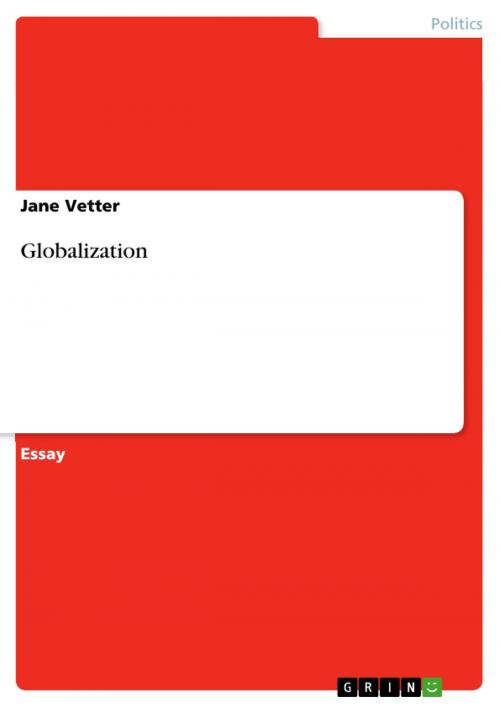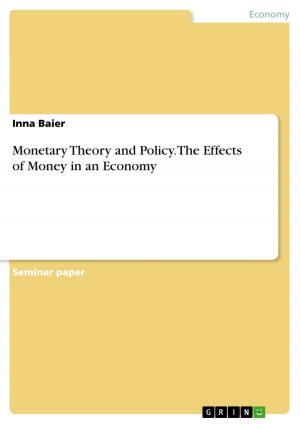| Author: | Jane Vetter | ISBN: | 9783640186327 |
| Publisher: | GRIN Verlag | Publication: | October 13, 2008 |
| Imprint: | GRIN Verlag | Language: | English |
| Author: | Jane Vetter |
| ISBN: | 9783640186327 |
| Publisher: | GRIN Verlag |
| Publication: | October 13, 2008 |
| Imprint: | GRIN Verlag |
| Language: | English |
Essay from the year 2006 in the subject Politics - International Politics - Topic: Globalization, Political Economics, University of North Florida, 5 entries in the bibliography, language: English, abstract: According to the online dictionary Merriam-Webster Online, globalization is 'the development of an increasingly integrated global economy marked especially by free trade, free flow of capital, and the tapping of cheaper foreign labor markets.' Globalization, however, reaches beyond the economic scope since it 'is a term that encompasses all cross-border interactions, whether economic, political, or cultural.' (Marber 56). Within a globalized world, everything is related and connected, constantly changing and transforming not only the economy but also politics, culture, consumption, and telecommunications. The following paper aims at showing how the world is becoming globalized, what advantages and disadvantages appear throughout this process, and why globalization is an overall good thing for the world and its citizens. As already mentioned, globalization affects several levels of interaction. With regard to the economy, free trade and less trade barriers enabled the forces of globalization to grow stronger and faster than ever before in human history. Within the last twenty years, the Soviet Union and China have integrated economically with the West while Latin America and Asia have worked toward stable and liberal systems in order to be part of 'meaningful socioeconomic progress and [...] Western standards of living.' (Marber 56).
Essay from the year 2006 in the subject Politics - International Politics - Topic: Globalization, Political Economics, University of North Florida, 5 entries in the bibliography, language: English, abstract: According to the online dictionary Merriam-Webster Online, globalization is 'the development of an increasingly integrated global economy marked especially by free trade, free flow of capital, and the tapping of cheaper foreign labor markets.' Globalization, however, reaches beyond the economic scope since it 'is a term that encompasses all cross-border interactions, whether economic, political, or cultural.' (Marber 56). Within a globalized world, everything is related and connected, constantly changing and transforming not only the economy but also politics, culture, consumption, and telecommunications. The following paper aims at showing how the world is becoming globalized, what advantages and disadvantages appear throughout this process, and why globalization is an overall good thing for the world and its citizens. As already mentioned, globalization affects several levels of interaction. With regard to the economy, free trade and less trade barriers enabled the forces of globalization to grow stronger and faster than ever before in human history. Within the last twenty years, the Soviet Union and China have integrated economically with the West while Latin America and Asia have worked toward stable and liberal systems in order to be part of 'meaningful socioeconomic progress and [...] Western standards of living.' (Marber 56).















